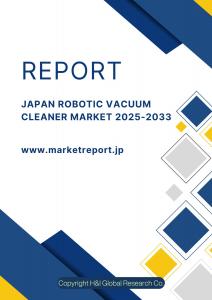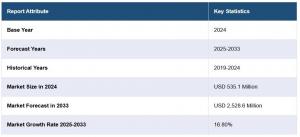New Report Analyzes Japan’s Robotic Vacuum Cleaner Market 2025–2033 : Smart Homes and Aging Demographics Drive Growth
Japan’s robotic vacuum cleaner market is projected to grow at a 16.8% CAGR through 2033, driven by smart home adoption and compact urban living.
TOKYO, JAPAN, May 9, 2025 /EINPresswire.com/ -- Japan Robotic Vacuum Cleaner Market OverviewThe Japan robotic vacuum cleaner market has witnessed remarkable growth in recent years, reaching a market value of USD 535.1 million in 2024. Looking ahead, the market is projected to surge to USD 2,528.6 million by 2033, registering a compound annual growth rate (CAGR) of 16.80% from 2025 to 2033. This strong performance is driven by a convergence of demographic, technological, and lifestyle trends, including rising disposable incomes, an aging population, shrinking living spaces, and increasing demand for automated, energy-efficient home cleaning solutions.
Key Market Drivers
The rise in smart home adoption across Japan is significantly influencing the robotic vacuum cleaner industry. As Japanese consumers become more tech-savvy and seek greater convenience, robotic vacuum cleaners are increasingly seen as essential components of connected living environments. Modern units are now integrated with smartphones, voice assistants, and home automation systems, allowing users to remotely schedule cleanings, monitor progress, and receive maintenance alerts.
Technological innovation remains a key enabler of market expansion. In January 2024, Mitsubishi Electric, in collaboration with HACARUS, introduced AI-based visual inspection solutions for robotics, showcasing the potential for deep AI integration in cleaning systems. These advancements appeal to the preferences of Japanese consumers, who value precision, automation, and ease of use.
Product Design Trends
Consumer preference is shifting toward compact, quiet, and energy-efficient models, aligning with Japan’s urban housing conditions. Compact designs are favored in smaller homes and apartments, while quiet operation addresses noise sensitivity common in densely populated areas. For instance, SwitchBot’s launch of the Mini Robot Vacuum K10+ Pro in August 2024 emphasized its compact dimensions and strong suction power, designed to clean tight spaces effectively.
Moreover, environmentally conscious and cost-sensitive consumers are drawn to the energy-saving features of modern robotic vacuum cleaners. Manufacturers are now focusing on developing lightweight devices with silent motors, contributing to both practical and sustainable cleaning solutions. These trends reflect Japan’s cultural emphasis on cleanliness, harmony, and efficient use of resources.
Smart Integration and Automation
Smart integration is becoming a central force in consumer purchasing decisions. Japanese households are increasingly adopting robotic vacuum cleaners that automatically adapt to room layouts, cleaning needs, and environmental conditions. The ability to seamlessly integrate with smart home ecosystems enhances user satisfaction, making robotic vacuums a preferred choice for automated daily cleaning.
Market Segmentation Overview
The Japan robotic vacuum cleaner market is segmented by type, charging method, distribution channel, application, and end-user:
- By Type: Robotic floor vacuum cleaners dominate the market, while robotic pool vacuum cleaners serve niche applications.
- By Charging Type: Automatic charging models are gaining traction due to their user-friendly nature.
- By Distribution Channel: Both institutional/direct sales and retail sales channels contribute to market growth, with e-commerce playing an increasing role.
- By Application: Devices that combine vacuuming and mopping functions are becoming more popular than vacuum-only models.
- By End-User: While the residential segment leads demand, commercial applications are expanding across hospitality, healthcare, offices, and retail sectors.
Regional Insights
Geographically, the market is analyzed across Japan’s key regions including Kanto, Kansai/Kinki, Central/Chubu, Kyushu-Okinawa, Tohoku, Chugoku, Hokkaido, and Shikoku. Urban regions such as Kanto and Kansai represent the largest shares due to higher technology adoption rates and population density.
Recent Market Developments
In January 2025, LG Electronics acquired a 51% stake in Bear Robotics, signaling its intent to strengthen its AI-driven robotics portfolio, including robotic vacuum systems tailored for Japan. Additionally, Roborock introduced five new smart cleaning devices at IFA 2024, featuring innovations such as the AdaptiLift Chassis and Dual Anti-Tangle System, underscoring a focus on smart automation and user adaptability.
Competitive Landscape
The competitive environment in Japan’s robotic vacuum cleaner market is characterized by continuous innovation, strong brand positioning, and growing international participation. Leading companies compete on the basis of technology integration, energy efficiency, product reliability, and smart features. Market players are also investing in R&D to differentiate their offerings and cater to evolving consumer demands.
A robotic vacuum cleaner is an autonomous cleaning device designed to vacuum floors without human intervention. Equipped with sensors, brushes, and suction mechanisms, it navigates around furniture, detects obstacles, and adjusts its cleaning path accordingly. Many modern models feature smart technologies such as mapping systems, scheduling functions, and connectivity to smartphones or voice assistants, allowing users to control and monitor cleaning remotely. Some units also offer additional features like mopping functions, automatic dirt disposal, and integration with smart home systems. Robotic vacuum cleaners are especially popular in households with limited time for manual cleaning, compact living spaces, or pets that shed frequently. Their ability to operate quietly and independently makes them an efficient solution for maintaining cleanliness on a daily basis. As technology advances, robotic vacuums continue to evolve in intelligence, cleaning efficiency, and adaptability, making them an increasingly essential part of modern home maintenance.
The Japan robotic vacuum cleaner market is set for rapid growth, driven by demographic shifts, urban lifestyles, and advancements in AI and smart home technology. Compact design, intelligent automation, and seamless integration with smart devices are reshaping consumer expectations. As demand intensifies, manufacturers must prioritize innovation, connectivity, and user-centric design to stay competitive in this dynamic and expanding market.
※For more details, please visit:
https://www.marketreport.jp/eng/japan-robotic-vacuum-cleaner-market/
※About H&I Global Research
Established in 2009 and based in Tokyo, Japan, H&I Global Research Co., Ltd. is a leading provider of market research and strategic consulting services. The company is committed to delivering accurate, insightful, and actionable market intelligence through a combination of syndicated research reports and customized research solutions. H&I Global Research supports a diverse clientele that includes large corporations, small and medium-sized enterprises (SMEs), government agencies, and academic institutions. Its extensive research portfolio covers a wide range of industries, including information technology, electronics, healthcare, automotive, consumer goods, energy, and industrial machinery.
• Corporate HQ website : https://www.globalresearch.co.jp
• Korea Office website : https://www.globalresearch.kr
PR Team
H&I Global Research Co, Ltd.
info@globalresearch.co.jp
Legal Disclaimer:
EIN Presswire provides this news content "as is" without warranty of any kind. We do not accept any responsibility or liability for the accuracy, content, images, videos, licenses, completeness, legality, or reliability of the information contained in this article. If you have any complaints or copyright issues related to this article, kindly contact the author above.
Why Founders Shouldn’t Be the Ones Running the Sales Team—Especially in Wellness Businesses
City Shift Finance Launches Tool for Cost of Living, Buy vs Rent, and Relocation Support
From $80 and a Basement Apartment to Entrepreneur of the Year at the 2025 CanadianSME Awards
Kalendarium
Więcej ważnych informacji
 Jedynka Newserii
Jedynka Newserii

 Jedynka Newserii
Jedynka Newserii

Transport

Polska przeciwna przedłużeniu umowy UE–Ukraina o transporcie drogowym. Uderza ona w krajową branżę transportową
Parlament Europejski większością głosów poparł przedłużenie umowy o transporcie drogowym między Unią Europejską a Ukrainą do końca 2025 roku. Zdaniem polskich europosłów, którzy głosowali przeciw, podtrzymanie liberalizacji przewozów drogowych przyczyni się do dalszego obniżenia konkurencyjności polskich firm transportowych. W przeciwieństwie do ukraińskich przewoźników muszą one spełniać szereg unijnych wymogów. Polska delegacja planuje przedstawić swoje stanowisko europejskiemu komisarzowi ds. zrównoważonego transportu i turystyki.
Transport
M.Kobosko: Wszyscy zapłacimy za eskalację między Izraelem a Iranem. Kraje UE powinny robić więcej dla budowy swojego własnego bezpieczeństwa

– Mrzonki o armii europejskiej są mrzonkami, to trzeba sobie jasno powiedzieć. Każdy z krajów członkowskich Unii Europejskiej musi, i to się na szczęście już dzieje, nie tylko myśleć i mówić, ale też robić coraz więcej dla budowy swojego własnego bezpieczeństwa w koordynacji wspólnej – uważa Michał Kobosko, poseł do Parlamentu Europejskiego z Polska 2050. W kontekście światowych konfliktów, w tym na linii Izrael–Iran, jego zdaniem Polska powinna się skupić na współpracy zarówno ze Wspólnotą, jak i Stanami Zjednoczonymi.
Muzyka
Trwający Festiwal Mozartowski przyciąga tłumy melomanów. To jedno z najważniejszych wydarzeń w stolicy

Artystka zaznacza, że za sprawą Warszawskiej Opery Kameralnej jeszcze przez dwa tygodnie Warszawa będzie rozbrzmiewać Mozartem. Kolejna edycja festiwalu poświęconego temu wybitnemu kompozytorowi zajmuje ważne miejsce w kulturalnym kalendarzu stolicy i przyciąga tłumy melomanów. A przed nimi jeszcze sporo atrakcji. Alicja Węgorzewska szczególnie zaprasza na dwie premiery, jedną skierowaną do młodych odbiorców, drugą – dedykowaną koneserom. Niezwykle ciekawie zapowiada się także nowy sezon artystyczny w WOK-u. Twórcy już pracują nad kolejnymi spektaklami i nagrywają nowe płyty.
Partner serwisu
Szkolenia

Akademia Newserii
Akademia Newserii to projekt, w ramach którego najlepsi polscy dziennikarze biznesowi, giełdowi oraz lifestylowi, a także szkoleniowcy z wieloletnim doświadczeniem dzielą się swoją wiedzą nt. pracy z mediami.










.gif)

 |
| |
| |
|